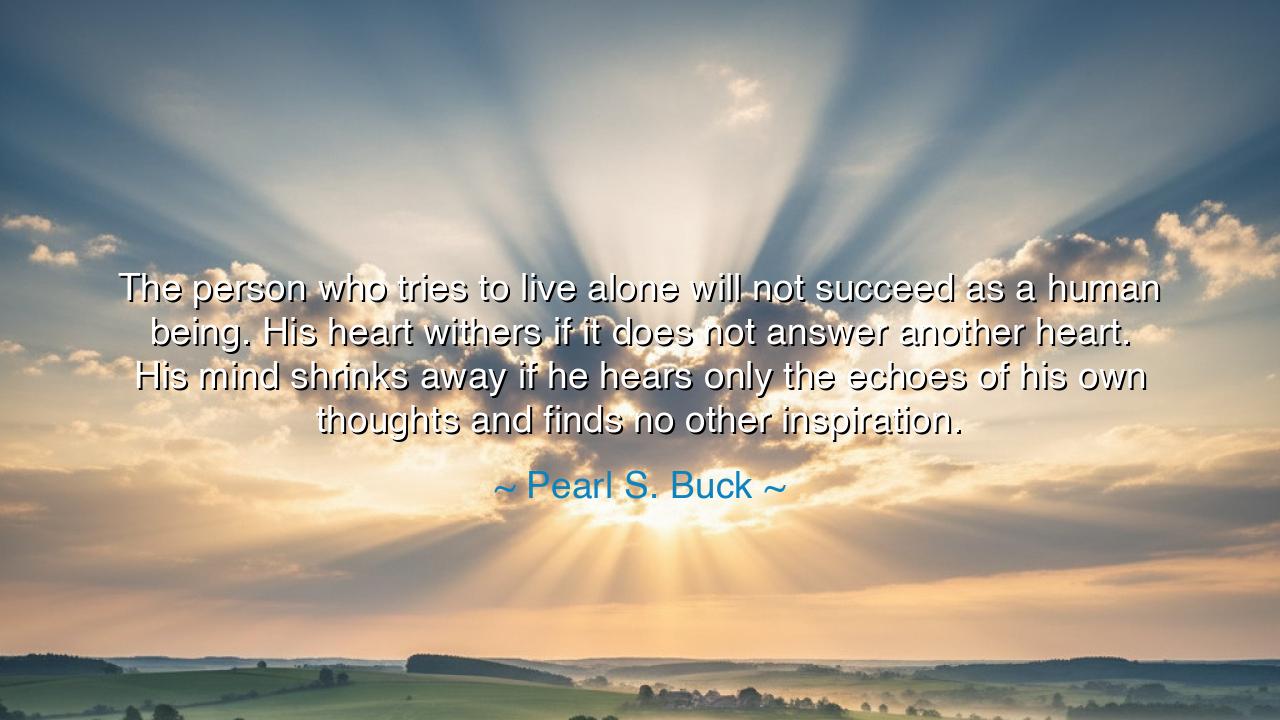
The person who tries to live alone will not succeed as a human
The person who tries to live alone will not succeed as a human being. His heart withers if it does not answer another heart. His mind shrinks away if he hears only the echoes of his own thoughts and finds no other inspiration.






In the luminous words of Pearl S. Buck, the great chronicler of human hearts, we find a truth as ancient as humanity itself: “The person who tries to live alone will not succeed as a human being. His heart withers if it does not answer another heart. His mind shrinks away if he hears only the echoes of his own thoughts and finds no other inspiration.” These words, tender and profound, rise like a hymn to the sacred necessity of connection—that invisible thread that binds one soul to another. Buck, who lived between cultures, between East and West, knew better than most that a person’s strength is not in solitude, but in communion, for we are made to know and to be known, to love and to be loved.
The origin of this wisdom flows from Buck’s own life. Born in America yet raised among the people of China, she witnessed the tapestry of humanity in all its forms—its suffering, its endurance, its grace. Through her novels, especially The Good Earth, she revealed how families, neighbors, and communities survive through their bonds to one another. Her writing was never only about individuals; it was about relationships, about the way hearts sustain each other through the storms of existence. Her quote is not an idle reflection—it is born from a life of observation and empathy, from a soul who had walked among the isolated and the embraced, and had seen clearly which flowered and which withered.
When Buck says that “the heart withers if it does not answer another heart,” she speaks of the spiritual starvation that comes from isolation. Just as a plant cannot live without sunlight, the human spirit cannot live without affection and understanding. To give and to receive love is not a luxury, but the very breath of life. The one who walls themselves off, who says “I need no one,” may preserve their pride, but they lose their humanity. Their emotions grow pale, their joy fades into dryness, and their compassion turns inward into dust. For the heart was not made to beat alone—it beats in rhythm with others.
Likewise, when she warns that “the mind shrinks away if it hears only the echoes of its own thoughts,” she reminds us that wisdom cannot exist in a vacuum. To think alone is to circle endlessly within one’s own limits. True growth comes from dialogue, from the clash and harmony of different ideas. When we speak and listen, when we learn from another’s story, our understanding expands. But when we retreat into isolation, our thoughts lose their freshness; they decay like water trapped in a sealed jar. The greatest philosophers, the wisest saints, all sought not only solitude, but fellowship. Even Socrates, though famed for his contemplations, found truth in conversation—with disciples, with strangers, even with those who opposed him. For it is through others that we refine our thoughts, and through empathy that we perfect our souls.
History offers many mirrors of Buck’s truth. Consider Robinson Crusoe, the fictional castaway who lived years in isolation upon his island. Though he survived, he was not fully alive until he found Friday, another human being to speak to, to share the burden of existence. His survival before was mere endurance; his companionship afterward was life restored. Or look to the monks and mystics of the ancient world—though they lived apart, they did not live alone. They wrote letters, taught disciples, prayed for the living and the dead. Even in solitude, they remained connected to the great heart of humanity. True isolation is not measured by distance, but by disconnection of the spirit.
And yet, Buck does not condemn solitude entirely. There is a time to walk alone—to listen to the stillness within, to understand oneself before seeking another. But solitude is fruitful only when it leads us back to others with greater compassion. The danger lies not in being alone, but in living as though one needs no one. The wise soul learns to balance reflection and relationship, silence and speech, independence and intimacy. For the one who returns from solitude with love in their heart carries a deeper understanding of others—and the one who withdraws from others with bitterness or fear carries only emptiness.
The lesson, then, is this: nurture the bonds that keep your heart alive. Seek understanding as you give it. Do not let pride, pain, or fear sever you from others, for the soul that shuts its door too tightly will soon find itself in darkness. Speak to someone; listen with your whole being. Let your heart answer another’s, even in small ways—through kindness, forgiveness, shared laughter, or silent companionship. For every act of connection rekindles the light within you.
So remember, O seeker of wisdom: no one is complete alone. The tree grows strong only in the forest, the flame burns brighter when it joins another flame. As Pearl S. Buck taught, our humanity is not proven in isolation but in relationship—in the answering of heart to heart and mind to mind. To live fully is to live with and for others, to weave one’s life into the great fabric of humanity. For the one who loves, listens, and learns from others does not merely exist—they become immortal in the shared warmth of human connection.






AAdministratorAdministrator
Welcome, honored guests. Please leave a comment, we will respond soon